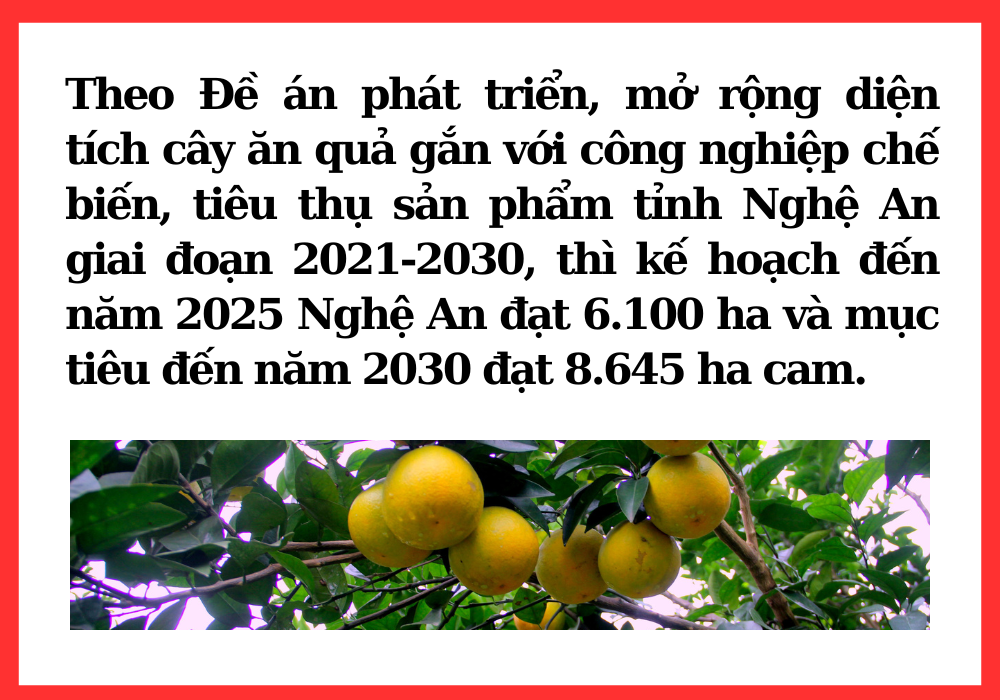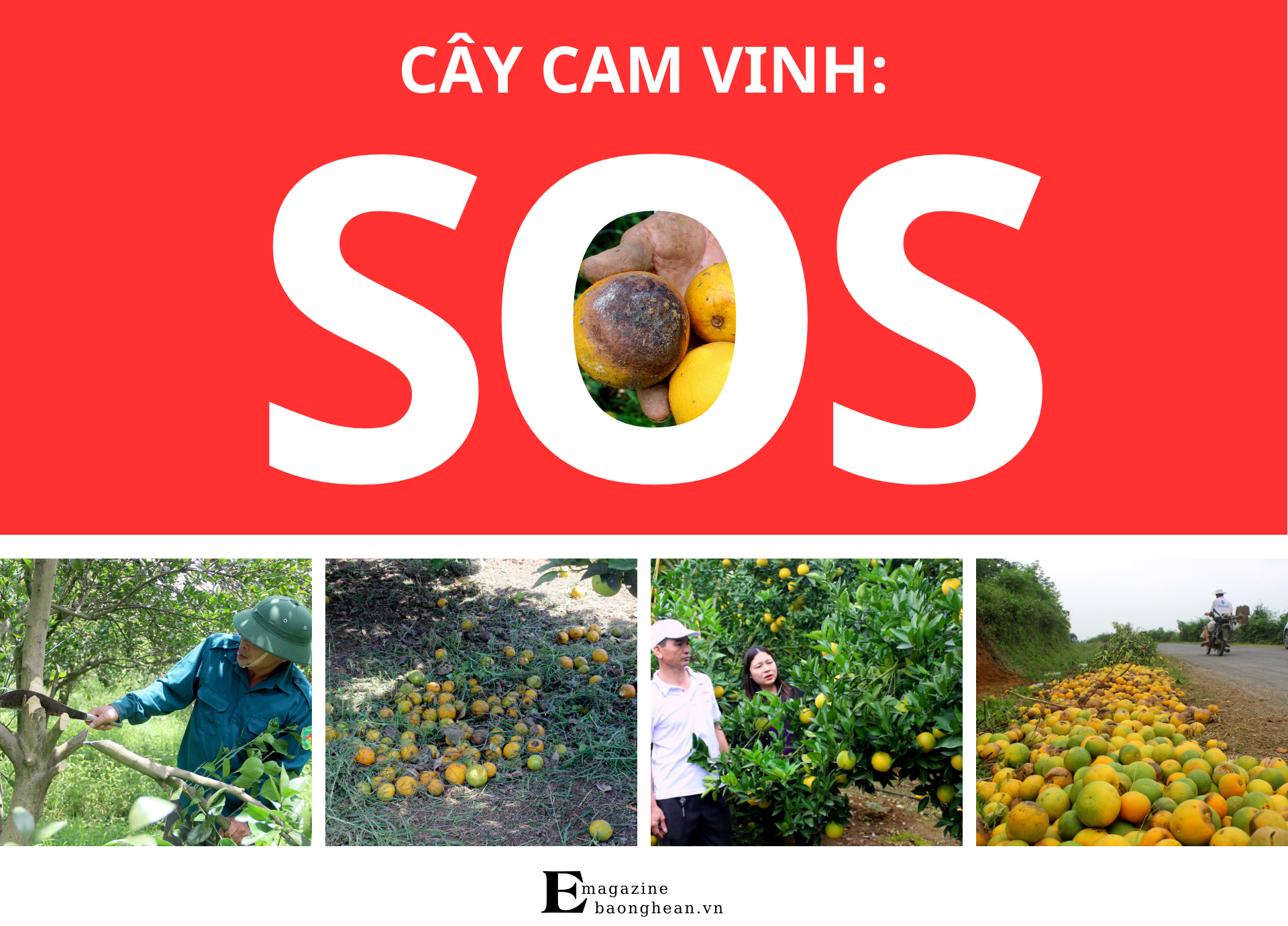
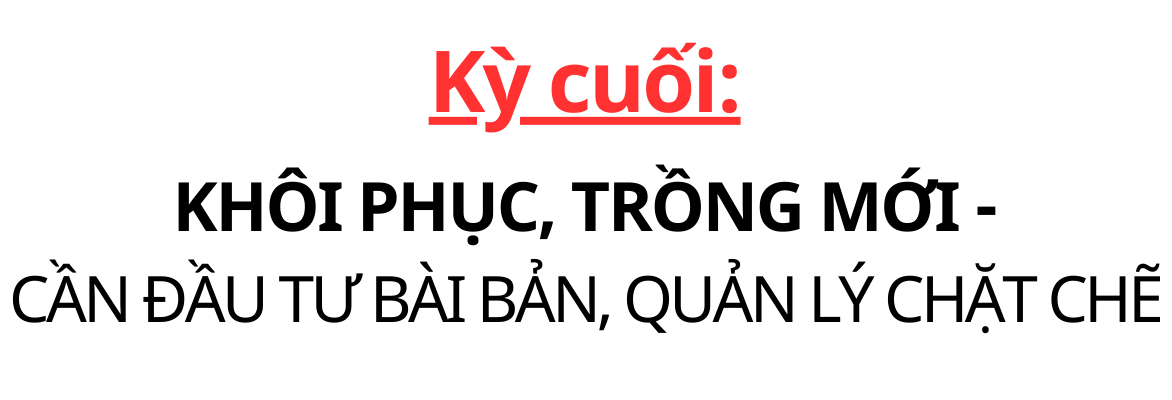
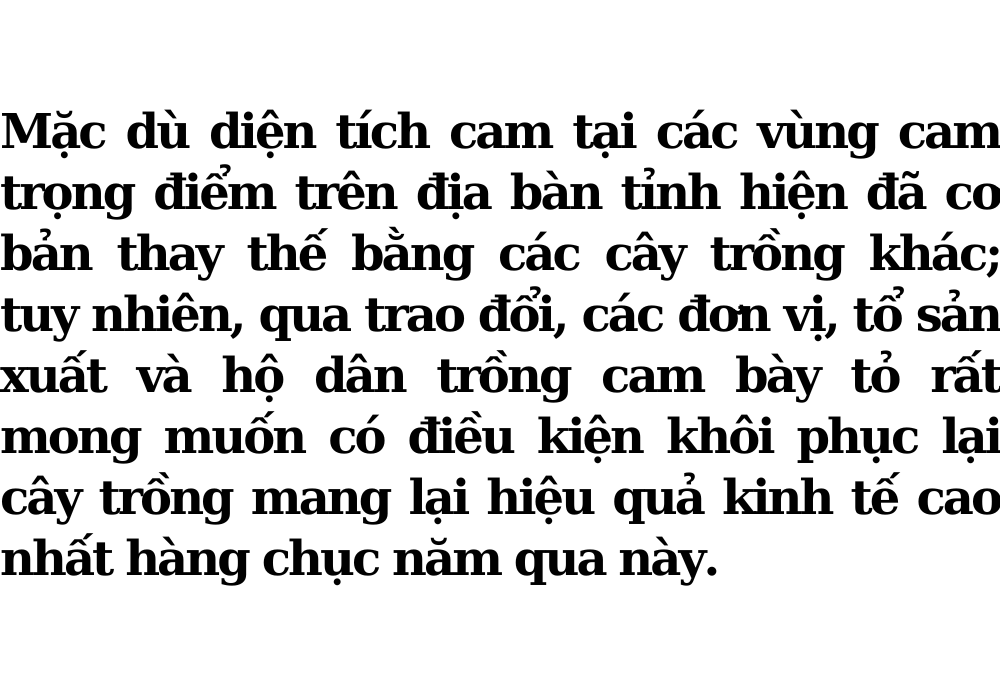
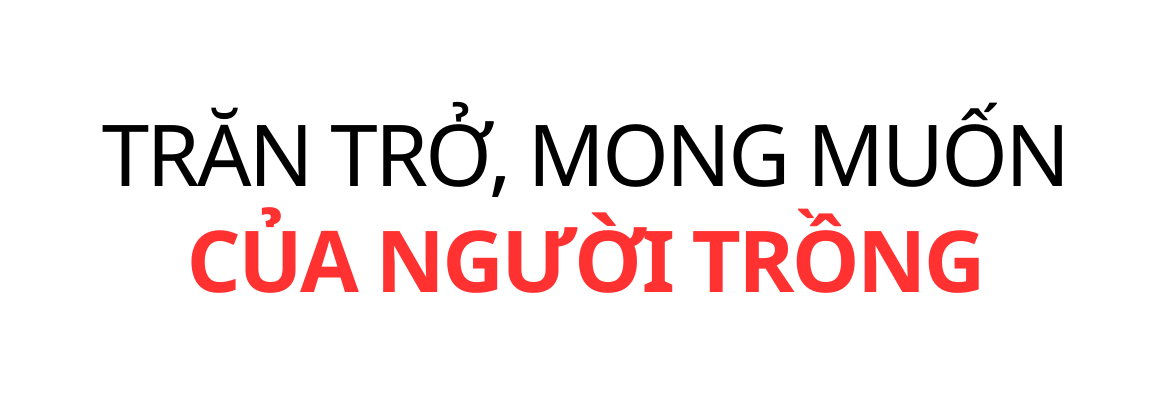
Tan Phu commune used to be a key area for Vinh oranges in Tan Ky district, with the famous Song Con orange production group, with an area of 25.5 hectares. However, now there is only one household maintaining a 1-hectare orange garden, with the hope of reviving the specialty of Vinh oranges in Tan Ky land; that is Mr. Ngo Anh Duc's household.
“About 10 years ago, the Song Con Orange Production Group had 21 participating households. In the first years, the orange trees brought very high economic efficiency. However, in the period of 2019-2020, the orange trees began to get sick and fell off in large numbers. Gradually, people could no longer survive so they cut them all down. My family also cut down some trees. However, I was determined to replant orange trees using the knowledge and experience learned from other orange regions and through books and newspapers,” said Mr. Ngo Anh Duc.
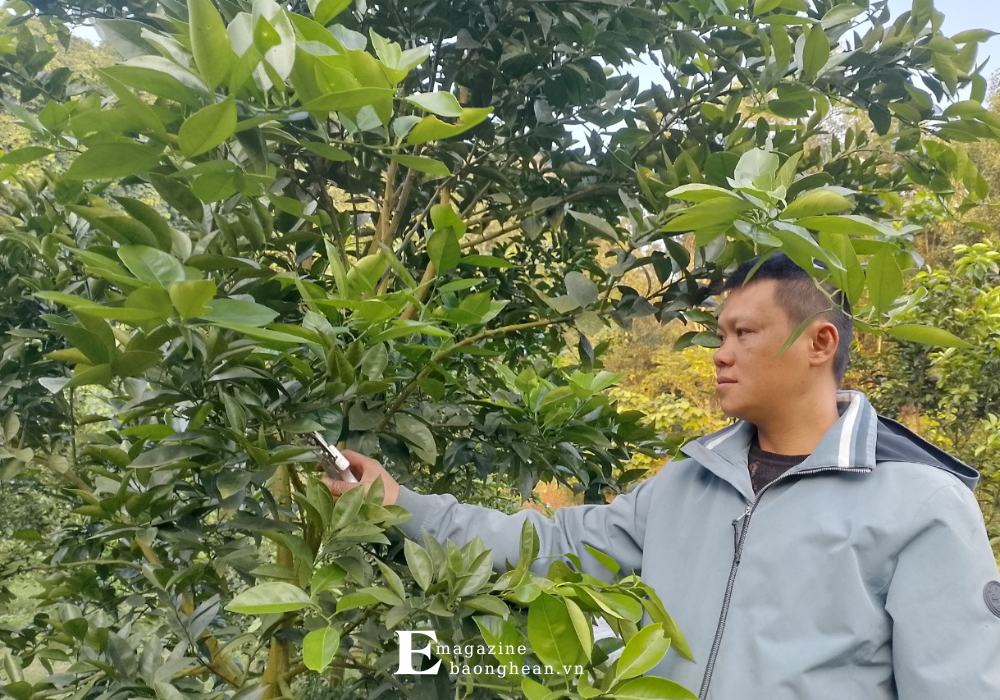
According to Mr. Duc, there were shortcomings in the previous orange care process of the cooperative that led to the early degeneration of oranges. When oranges were infected, people did not know how to handle it, and when oranges were the main product, a large investment, causing people to panic and buy pesticides in bulk to kill pests. The abuse of pesticides caused the soil of dozens of hectares of oranges to be damaged, the oranges to grow poorly, and the disease could not be completely treated... Learning from that failure, in 2021, after completely cutting down the old orange crop, Mr. Duc's family planted 400 new orange trees. The difference was that Mr. Duc did not plant on the old area but on new land, away from the infected land. This year, when oranges were infected, Mr. Duc also limited the use of pesticides as much as possible, instead using safer biological products, using nets and bags to cover the oranges, avoiding insect bites. With new land and new care methods, Mr. Duc's orange garden is now growing well, has yielded the first harvests of fruit and has guaranteed productivity.
However, Mr. Duc is also very concerned, because currently there is no specialized fertilizer for orange trees; orange growers have to buy different types of fertilizers to fertilize, making it difficult to choose good quality products. Regarding pesticides, there are too many varieties, one pest can be prevented by dozens of active ingredients; each active ingredient is produced by many companies and brands. When buying pesticides, most people only state the type of disease and the seller advises and supplies the medicine, so it is inevitable to use many types of medicine, non-specific medicine or medicine that does not guarantee quality.
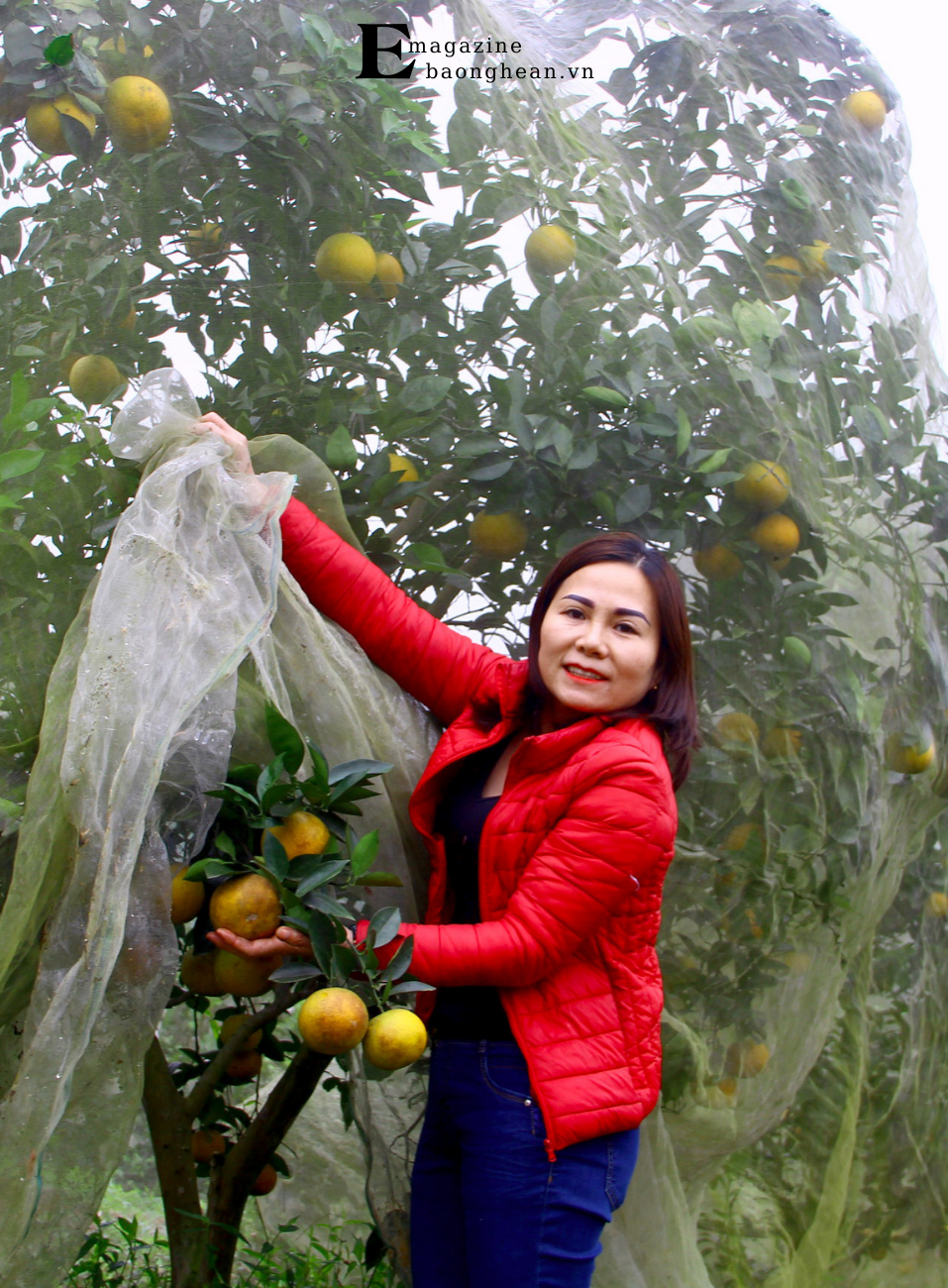
The desire to restore orange trees is also the wish of the people in Minh Ho hamlet, Minh Hop commune - the most famous area for Vinh oranges in Quy Hop district in the past. Regretful, worried, and eager to return to growing oranges, however, to avoid following the "mistake" of having to destroy orange gardens, people really need support from the State. Mr. Ngo Van Hien - Head of Minh Ho hamlet said: "If we decide to replant oranges, we hope that the orange growing areas that have been converted to sugarcane and corn will be completely free of pathogens, and soil samples will be taken for testing and research to ensure safety so that people can rest assured to plant. Second, the authorities need to research and select varieties, fertilizers, and pesticides that ensure quality and are suitable for orange production; at the same time, organize training, propaganda, instruct farmers on how to use and strictly control the quality of agricultural materials in the area", Mr. Hien expressed.
A representative of Xuan Thanh Agricultural Company Limited in Quy Hop District said: In recent years, the company's orange acreage has been increasingly shrinking, from 1,000 hectares at its peak, now there are only a few dozen hectares of PQ oranges and tangerines. The remaining orange gardens are also gradually deteriorating, and it is predicted that people will destroy them in the near future. Currently, the company has also suspended and stopped growing citrus trees to rotate with other crops.
According to Mr. Le Viet Minh - Director of Xuan Thanh Agricultural Company Limited, the fact that orange gardens were wiped out is very regrettable; however, it is also a must to eradicate pathogens, creating conditions for orange revival as soon as possible. The company determined that the time to replant oranges will be after 2030... For the replanting of oranges to be most effective, all levels, sectors, and local authorities need to accompany and support people and orange growers. In particular, the most desirable thing is to form a center for quality orange varieties, ensuring prestige, accepting high prices, not allowing people to buy and sell floating orange varieties as is currently the case. Because choosing quality orange varieties has helped ensure 50% of the growth and development of oranges after planting.
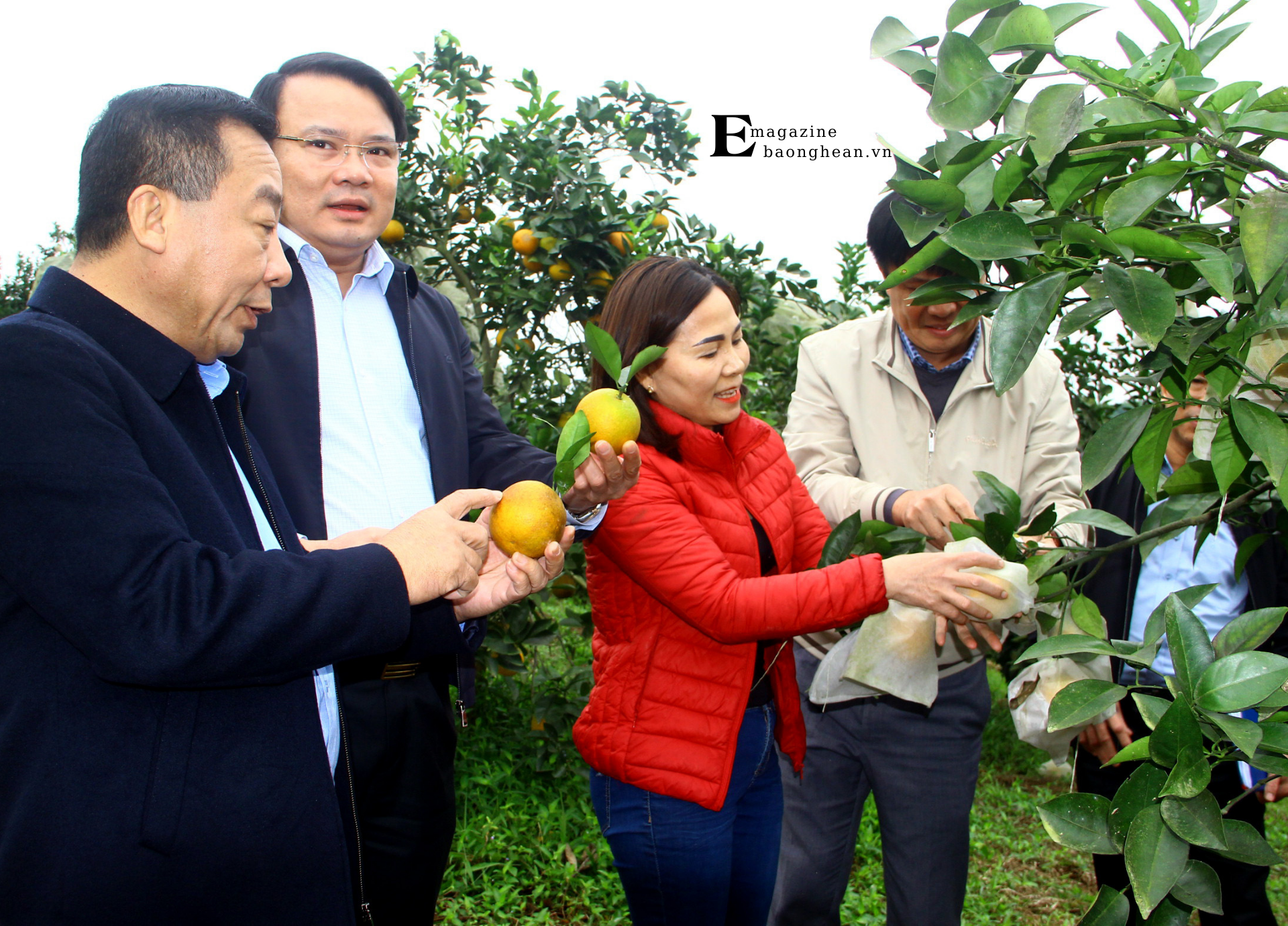
“We hope that all levels and sectors will research and re-plan orange growing areas to ensure proper geographical indications and close supervision, and discourage orange growing in unsuitable areas. For example, our company used to have 1,000 hectares of oranges, but in reality, the area with sufficient climate, soil, water resources... to ensure orange production is only about 300-400 hectares. It is understandable that oranges are grown massively beyond planning and on unsuitable land, resulting in a decrease in orange productivity and quality...”, Mr. Le Viet Minh emphasized.
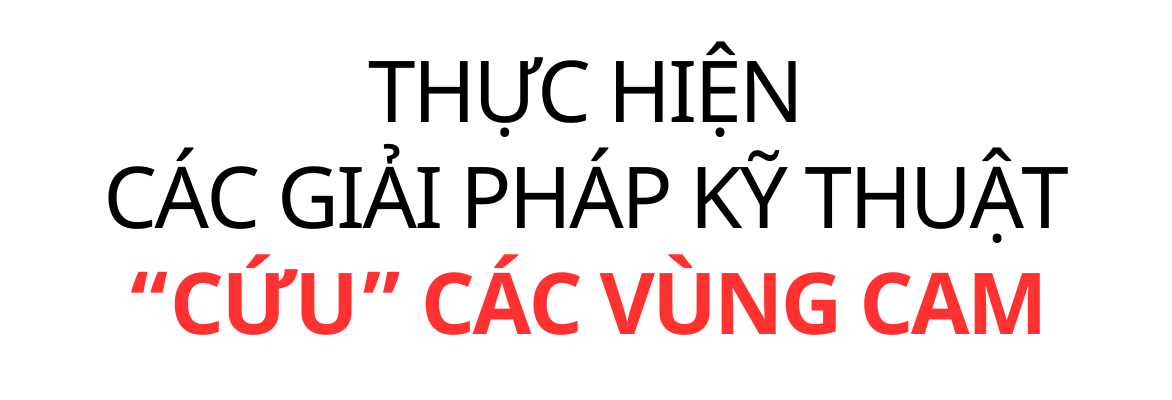
Faced with the current state of orange tree decline, the Department of Agriculture has directed the Department of Cultivation and Plant Protection to conduct an investigation and propose technical solutions to save the province's orange growing areas.
Mr. Nguyen Tien Duc - Head of the Provincial Department of Cultivation and Plant Protection said: Currently, the whole province has 1,820 hectares of oranges, of which more than 943 hectares are degraded. Thus, there are about more than 877 hectares that have not been degraded, accounting for 48.19%; first of all, this area must be well cared for, in which, orange gardens from 1-7 years old need to be allocated budget support from the province and districts, and intensive investment for long-term and sustainable exploitation. For 943 hectares of degraded oranges, it is necessary to review and classify them down to each household garden; for 361 hectares of severely degraded oranges, it is necessary to destroy them as soon as possible to limit the spread of diseases, especially greening disease; for nearly 500 hectares of oranges with moderate degradation, it is necessary to evaluate and determine the ability to invest and care; Households with good capacity for intensive investment should renovate and restore, otherwise consider destroying the entire garden or severely degraded trees. In the remaining orange area, there are nearly 90 hectares of slightly degraded oranges, people should invest in intensive farming to renovate and restore, however, degraded gardens due to degenerated varieties or greening disease should not be renovated and restored but should consider destroying.
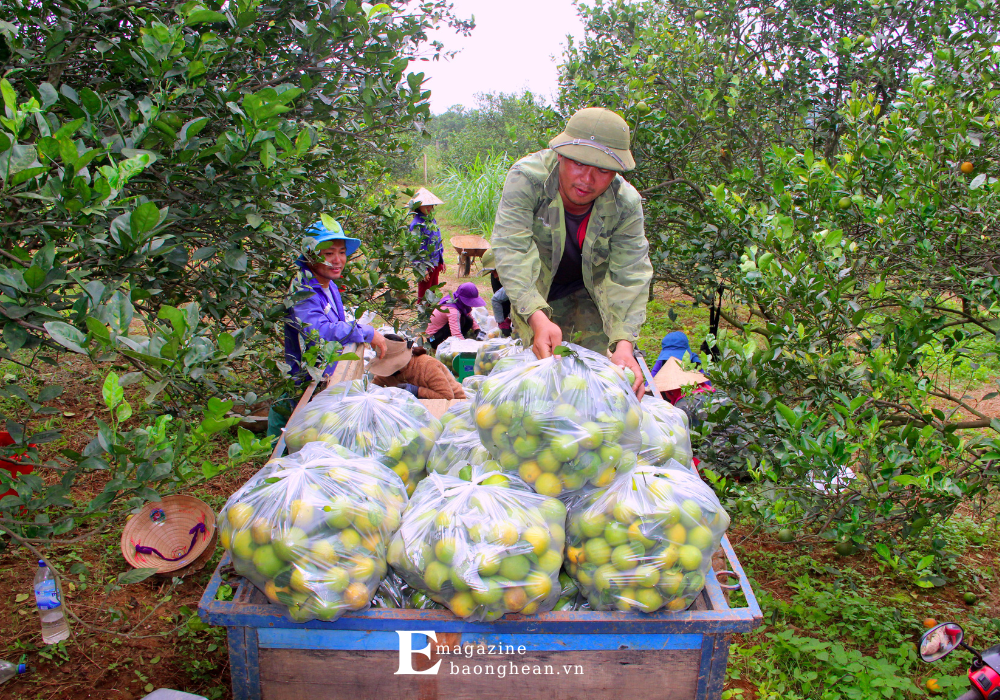
“Localities also need to develop a plan to change the crop structure on the destroyed orange acreage, especially for areas with plans and plans to replant orange trees. There needs to be mechanisms and policies to encourage people to change crops while still keeping good soil to replant orange trees,” Mr. Nguyen Tien Duc further emphasized.
On the local side, Vice Chairman of the People's Committee of Quy Hop district - Mr. Quan Vi Giang said: The most feasible solution for Quy Hop orange growing area at present is that localities will improve the land for perennial orange growing by crop rotation measures so that the land can rest and pests can be eliminated. The district will re-plan each orange growing area with standard conditions of land, water resources, climate, etc.; at the same time, require localities to maintain the planning, not to massively expand the area. In addition, before replanting oranges (possibly in 4-5 years), the locality will conduct a general inspection, test, and carefully take samples of soil, water, and environment to ensure that the oranges will grow and develop well when planted...
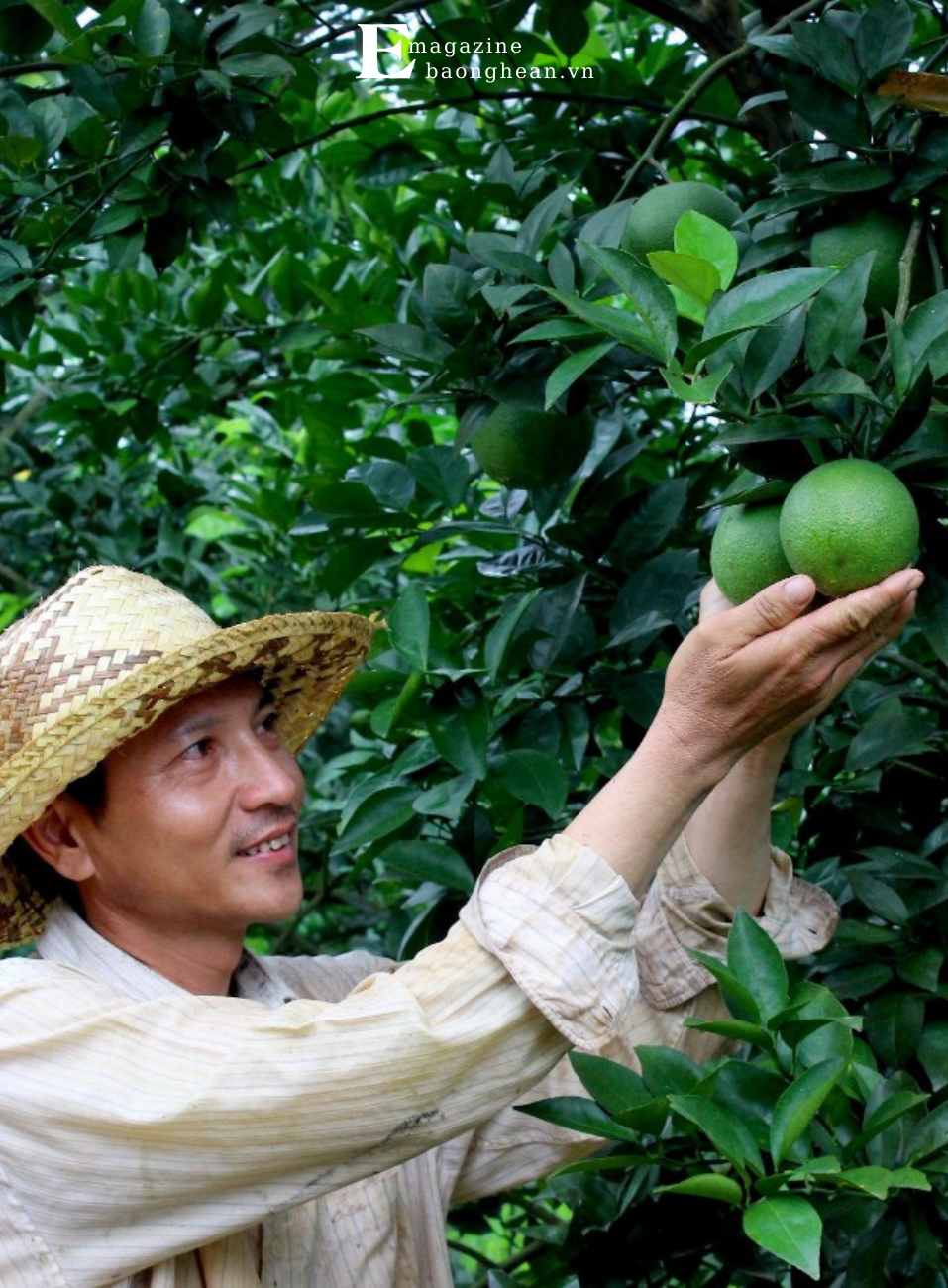
Discussing this issue, Mr. Phung Thanh Vinh - Director of the Department of Agriculture and Rural Development said: We will only plant new oranges on experimental models or new planting, replanting with technical guidance from specialized agencies. The Department of Agriculture will coordinate with localities to strengthen good management of the implementation of production planning, especially at the commune level, publicly disseminate planning to the commune level to help people grasp planning information to seriously implement; In case of arbitrary planting outside the planning, they will not enjoy support policies, the commune level has the right to request demolition. For the land for growing citrus fruit trees that has been demolished, oranges must be replanted after 3-5 years of crop rotation. At the same time, strengthen management solutions, apply technical advances to ensure the quantity and quality of seedlings and input materials for orange production.
In particular, research and develop technical processes for new planting and replanting orange trees suitable to the climate and soil conditions of Nghe An. Develop specific and detailed processes for nutrient management and integrated disease prevention on orange trees, thereby guiding and organizing training for farmers on technical processes for building productive, high-quality and sustainable orange gardens.
Obviously, at this time, Nghe An is having to "rebuild" the orange material area almost from scratch; in which, focusing on ensuring the land fund is almost completely disease-free; having a source of clean seedlings and a strict, scientific cultivation process so that orange growers can feel secure in their cultivation.
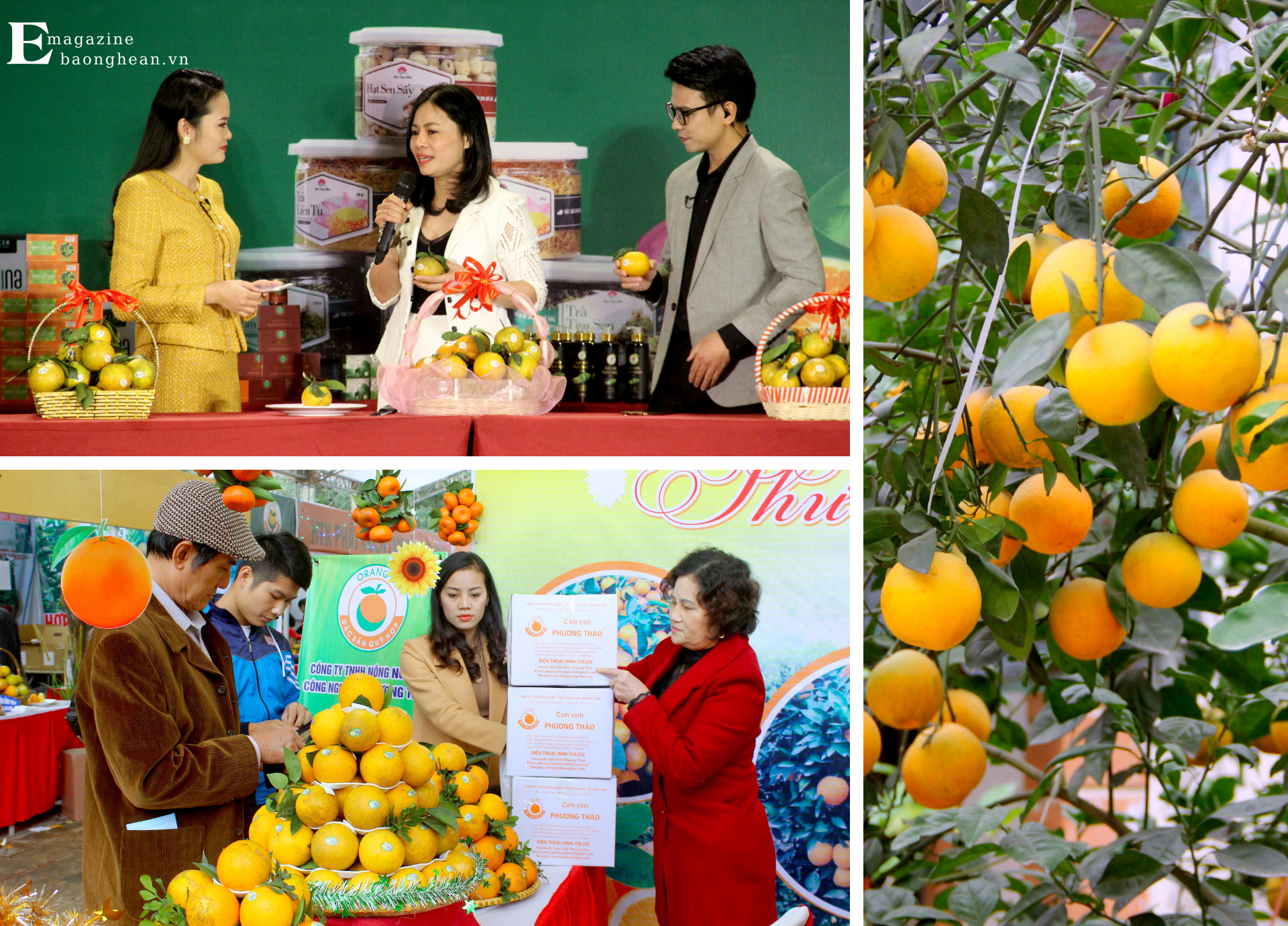
The province will encourage and facilitate organizations and businesses to participate in chain linkages, applying advanced science and technology and high technology in all stages from breeding, planting, care, harvesting, preservation, processing and consumption; strengthening brand building, trade promotion and product consumption for Vinh oranges.
